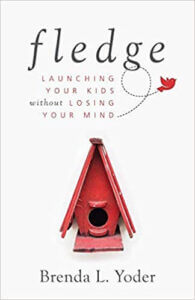 It had been the last summer with everyone home. Our eldest was in Mexico for her first week as a missionary. Our second oldest was back on campus for his senior year of college. Our college freshman was settling into his first week at the university, and our youngest, a high school sophomore, was well underway in his school year.
It had been the last summer with everyone home. Our eldest was in Mexico for her first week as a missionary. Our second oldest was back on campus for his senior year of college. Our college freshman was settling into his first week at the university, and our youngest, a high school sophomore, was well underway in his school year.
I stood in my kitchen that was awkwardly quiet on the first day with everyone gone. It was just me, my cup of coffee, and a lot of tears.
I let the tears fall. I had anticipated this moment for months, facing the fact that three of my four children were fledging and the end of the childrearing years was upon me. I gave myself permission to feel, to remember, and to cry. It was full-blown mom grief.
Mom grief is a term I coined during the last couple of years as my world quickly changed. Grief is where I was stuck, teetering back and forth between holding on and letting go, between looking back and not wanting to look forward. Grief is your natural response to the loss of a person or something important to you. For a mom whose nest is emptying, there’s a lot of loss.
Standing in the kitchen that day, I was overwhelmed by memories. I remembered the days when the kids were babies, when my love for them was so big and deep I thought I’d explode.
I ached for the days when the kids were young. Though they still needed me, it wasn’t the same.
Other memories came. Days of board games and impromptu drama productions. Memories of one-on-one car rides with teens before they could drive, when they briefly let you into their complicated world. I longed for these days. My body physically ached.
I also grieved the hard days of postpartum depression and the days I knew I had failed. Good and bad, I missed all of it.
There in my kitchen on that early fall morning, I gave in to the mom grief and wept. This crazy, exhausting, and exhilarating time of life was ending.
Types of Grief
 Over the last three years since writing that scene in Fledge: Launching Your Kids Without Losing Your Mind and launching our youngest to college, I’ve been able to distinguish which types of mom grief I’m experiencing in various moments. Naming and claiming mom-grief is cleansing. It makes what’s intangible, tangible. You don’t just miss your child or children who go to college, move out, or get married. There’s so much more than just an empty house.
Over the last three years since writing that scene in Fledge: Launching Your Kids Without Losing Your Mind and launching our youngest to college, I’ve been able to distinguish which types of mom grief I’m experiencing in various moments. Naming and claiming mom-grief is cleansing. It makes what’s intangible, tangible. You don’t just miss your child or children who go to college, move out, or get married. There’s so much more than just an empty house.
There are several types of grief a mom can experience in this vulnerable stage of the empty nest. Sometimes you might feel one type of grief. Another time, it’s many rolled into one. Leaning in to each of them and mourning them is important.
Here are the most common types of empty nest grief and loss:
- The Missing Your Kid Grief. You don’t just physically miss your kids, you miss their smile, their laughter, and their individual relationship with you. If we’re honest, we miss some kids more than others. It’s what makes this grief kind of complicated.
- The Full House Grief. You miss the family you’ve known up to this point. That family has been your “normal” for two or three decades. Kids’ activities and day-to-day happenings bring a comfortable, familiar routine. The new, quieter routine of an empty nest can feel threatening and loud.
- The Loss of Youth and Fertility. Women experience so much change in midlife. You may grieve the physical loss of childbearing or what it represents. A fertile womb represents youth and life: the end of childbearing represents a permanent ending to something very personal. The irony, however, is that a woman’s body experiences similar hormones and emotions in both pregnancy and midlife. We shed tears when we carry a baby and give birth, and we have similar emotions when it’s time to release. A child leaving is intricately tied to a mother’s body, soul, and spirit.
- The Grief of Regret. You may regret the mistakes you made with your kids, some of which may be significant. We each do the best parenting we can, given what we know at the time. But God is the redeemer of the years the locusts have eaten, as described in Joel 2:25. This verse has become a significant promise to me as a parent who knows the grief of regret.
- The Loss of Hopes and Dreams. You may also feel loss for your kids whose childhood experiences have been painful because of their own choices, the behavior of others, developmental challenges, or circumstances that prevented natural child development. You regret your children didn’t experience the happy, carefree childhood you wanted for them or that they didn’t experience success according to the world’s standards. Though we hate to admit it, society’s norms influence our parenting hopes and dreams.
- The Grief of Disappointment. You might experience disappointment in the young adults or adults you’ve raised. Some might be living a life you never thought a child of yours would live. Or perhaps you’re disappointed when your adult children don’t call, come around, or even acknowledge your birthday or Mother’s Day. Disappointment grief reminds you of all the things you’ve done for your kids and reinforces the hurt of disregard and disrespect.
- The Grief of Estrangement. This grief is for those who have lost communication or relationships with their children due to divorce or addiction or estrangement. These losses are rarely talked about in the Christian community, yet they’re real.
- The Grief of Death. Perhaps the deepest grief a parent can experience is the loss of a child by death, whether by miscarriage, stillbirth, abortion, or a childhood tragedy. The death of a child is a deep loss only those with similar experiences can fully understand.
- The Loss of Identity. For women, all of this grief is compounded by hormones, emotions, and loss of identity as Mom. There’s uncertainty and insecurity as your role and relationships with your kids change. Until you’re more accustomed to parenting adult children, you’re in uncharted territory. It can feel scary and often lonely, because your spouse can’t fully identify with your experience of motherhood. A father’s identity and role are different from ours. The empty nest can be a lonely experience, even if you’re married.
Grief and Grace
We need other women who are walking through similar mom grief, like the ones who reached out to me on my son’s wedding day. Two texts came from mothers of adult boys who understood, before I did, the awkward feelings I would have realizing the role in my son’s life was forever changed. Their comforting words helped me in moments when I felt those familiar feelings of grief, vulnerability, and uncertainty.
Those friends extended grace when I needed it, letting me know my feelings were normal.
We moms need to help each other accept the grief of the empty nest. We need God’s grace because many of us feel exhausted. We’ve given everything we have to our kids; our time, energy, worry, and love.
We haven’t done it for the applause. We’ve done it because we love our kids with an affection so deep we can’t explain it. Your kids may never know that while they separate from you and live their own lives, they’re still part of you.
That’s why empty nest grief feels like gaping holes in your heart. But I want you to know it’s normal. You’re not alone. And it won’t feel this way forever.
This is where we empty nest moms are. When you grieve, give yourself grace. And let’s do it together at the next Empty Nest Full Life Retreat.
***************************************
From Jill:
 Brenda Yoder was one of the speakers at the very first Empty Nest Full Life Retreat! She is an author, Licensed Mental Health Counselor, and is the host of the Life Beyond the Picket Fence podcast.
Brenda Yoder was one of the speakers at the very first Empty Nest Full Life Retreat! She is an author, Licensed Mental Health Counselor, and is the host of the Life Beyond the Picket Fence podcast.
Brenda and I are committed to help you process your empty nest emotions, foster a healthy relationship with your young adult kids, and launch into the full life in front of you!












YES! You get it, someone gets it! My heart breaks again every time I hear from him and every time i dont! I feel all alone in my grief even though i have the most loving and supportive husband in the world. My whole body aches and i dont know what to do.
Thank you for sharing, i needed to know that i’m not crazy and i’m not alone. Thank you!
You’re very welcome! I’m so glad it was helpful!
Preparing my heart and mind for this as my daughter moves 20 hours away in just two weeks. I’m not ready for this. Thank you for your words of hard truth. The house feels empty already and she’s just packing 💔
You’ve got this Barb!